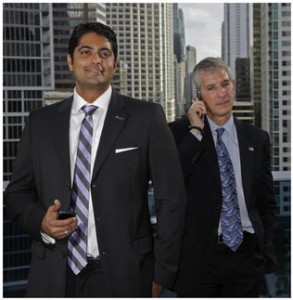Miami to NY: We’re ready for you
By Douglas Hanks
 Miami hopes to lure hedge funds out of New York with an updated twist on a familiar message: Come south for warm winters, zero state or city income tax and — finally — a downtown worthy of Wall Street’s elite.
Miami hopes to lure hedge funds out of New York with an updated twist on a familiar message: Come south for warm winters, zero state or city income tax and — finally — a downtown worthy of Wall Street’s elite.
“It’s really showing the maturity of our city,’’ said Nitin Motwani, a Miami developer and board member of the Downtown Development Authority. “The more people get familiar with what is happening in Miami — the real Miami — the more people are going to say, ‘I’m going to give Miami a shot.”
The campaign to woo hedge funds, private equity firms and other money managers by Miami’s DDA is the latest front in South Florida’s decades-long effort to move beyond its dependence on tourism, trade and construction to drive the economy.
The familiar trope of a year-round vacation looms large in the DDA’s message, as does comparing Florida’s lack of an income tax with the 13 percent levy paid by top-earning Manhattanites. But this campaign also rests on proving Miami’s bona fides for some of the wealthiest executives in finance. With a new wave of celebrated restaurants, a growing downtown cultural scene and an ongoing embrace of the “new Miami” by national media, the DDA sees an opportunity to make its message stick.
“You know what’s important to these guys? Where they go to lunch,’’ said Marc Sarnoff, the city commissioner who serves as DDA chairman. “Dinner means something to them. The symphony means something to them. Now, all of a sudden, you have a developed environment to satisfy these guys.”
The tax-funded DDA reserved about $50,000 for the “Finance Sector Initiative,” Sarnoff said. So far, that’s paid for Sarnoff, Motwani and the DDA executive managing the effort, Sonja Bogensperger, to travel to hedge-fund hotpots of New York and Greenwich, Conn., to host events. With the winter conference season beginning in South Florida, the DDA plans to host Miami events for visiting money managers, including a tour of the new Perez Art Museum opening downtown during the week of the Art Basel fair.
Organizers don’t expect a flood of relocations. The agency’s public relations firm, Schwartz Media Strategies, said it could not yet provide the name of a fund that has moved thanks to the effort, which is about six months old. An offer to give interested funds six months of free office space on Brickell Avenue was discontinued after no takers emerged.
“We think we’re just at the gaining-traction stage,’’ Sarnoff said.
A key part of the DDA campaign centers on Miami’s current finance sector, particularly its respectable core of hedge-fund notables. Last year, Eddie Lampert, a hedge-fund billionaire whose holdings helped make him the CEO of Sears, caused a stir by moving his official ESL fund headquarters out of Greenwich, Conn. and spending $38 million for a mansion in Indian Creek Village. (While ESL is officially based in Bay Harbor Islands, most of its staff remained with Greenwich firms working for ESL, according to a report by Hedge Fund Alert..) Mutual-fund heavyweight Bruce Berkowitz $10.5 billion Fairholme Capital Management has its headquarters in Miami and a staff of almost two dozen people.
Everest Capital, which manages an estimated $2.3 billion, has two offices: one in Miami, where it was founded, and the other in Singapore. Trivest and HIG, two prominent private-equity funds, also have headquarters in Miami.
“There’s a growing ecosystem. That’s wt is exciting,’’ said Julie Neitzel, a partner at WE Family Offices, a Miami firm that manages investments for families with assets of at least $50 million. She said she measures progress when it comes time to fill a position in WE’s 40-person office. “Five years ago, it was really hard to find good talent here.”
New York remains the undisputed center of the hedge-fund universe. Chicago, Boston, Connecticut and San Francisco are among the notable outposts. Each of those cities is home to at least one firm listed in The Hedge Fund Journal’s list of the top 50 fund managers in the country. ESL snagged No. 34 on the list with $11 billion under management, but the company was still listed as being from Greenwich, Conn.. No South Florida address made the roster.
Josh Gelfman, who left New York City’s economic development arm to fill a new economic-development post created by Miami-Dade Mayor Carlos Gimenez, said Miami offers a good value for hedge-fund managers. But he warned they have limitless options when deciding to move.
“I think it’s an incredibly competitive challenge,’’ Gelfman said of the DDA campaign. “You’re talking about folks who can operate anywhere in the world.”
Financial executives say a natural growth spot for the city’s financial sector are satellite offices by funds who want a Miami base to meet with Latin American clients. Still, in a recent presentation by Motwani and Sarnoff to local fund managers, there was little talk of Miami’s familiar role as the “Gateway to the Americas,’’ a common selling point for economic development.
That hints at another aim behind the hedge-fund push: while Miami already serves as a financial capital of Latin America, the DDA campaign could boost the city’s profile as a finance hub for the United States.
“I thought we would be much more dependent on Latin America” in making the pitch to hedge funds, Sarnoff said. “When you get around these guys, it’s not that at all. You hear a lot about Miami being an alternative to New York.”
James Varnadoe, managing director of Miami’s KVR Trade Finance, which provides loans for importers and exporters, said the campaign’s success may depend on how comfortable hedge-fund managers feel about the social scene in Miami.
“In New York, if you talk to the hedge funds, they want a social environment where they can talk to other hedge-fund managers,’’ said Varnadoe, who is also a board member of the Miami Finance Forum. “I think there’s enough hedge-fund and private-equity guys to start that.”
As with most economic-development programs, it’s hard to sort success from relocations that would have happened anyway. Sarnoff said one hedge fund from California, which he would not name, is in the midst of moving to Miami.
The firm has rented space in Coconut Grove’s SBS office building, Sarnoff said. The firm plans to employ 25 people with an average yearly salary of $100,000, according to county documents. Miami-Dade commissioners granted the unnamed firm $63,000 in state and local incentives tied to future job creation. (County procedures call for the firm to be made public once the deal is exercised.)
For Sarnoff, one of the biggest changes working in Miami’s favor comes from technology. As it becomes exponentially easier to conduct business from afar, leaders of small-shop hedge funds have fewer reasons to stay put. “Twelve years ago,’’ he said, “an attachment was something you put on your trailer hitch.”
A recent Bloomberg article depicted Lampert as an anxious flyer who rarely visits the Sears headquarters in Illinois. Instead, he grills executives via video conference. Ben Beavers, founder of one of the country’s top wealth-management firms, said he left Chicago for Coconut Grove only because he could so easily stay linked to the office while enjoying Miami life.
“I would say Miami’s principal advantage, unless you’re focused on the natural connection to Latin America, is probably the amenities it offers in terms of lifestyle,’’ said Beavers, whose Gresham Partners recently landed on No. 6 of AdvisorOne’s list of the top wealth-management firms in the country. Miami is “certainly way behind New York, Boston, and Chicago just because of the number of people in the industry.”
South Florida is already a popular vacation and second-home location for hedge fund managers, in part as a way to dodge New York’s income tax. Known as the “six-months-and-a-day crowd,” the DDA’s hope is to convince part-time South Florida residents to take the plunge and move down permanently.
Sean Kelleher used to commute to New York from New Jersey, a journey that took up two-and-a-half hours every day. The chief investment strategist for Shay Assets Management, Kelleher moved to Miami in 2011 and now works out of an office on Brickell Avenue. He recommends the move. “Good pizza is the only problem,’’ he said.




 See More Blogs
See More Blogs
Comments